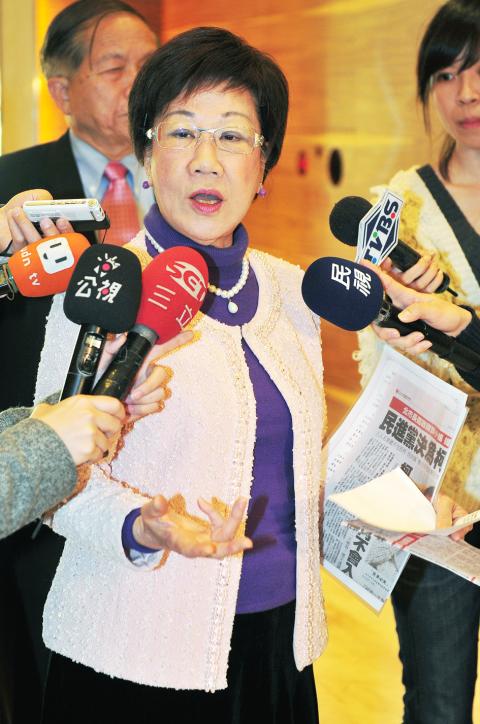Former Taipei EasyCard Corp chairman Sean Lien (連勝文), who is scheduled to announce his bid to run in the Taipei mayoral election today, should disclose his relations with Beijing and whether he holds foreign nationality, former vice president Annette Lu (呂秀蓮) said yesterday.
Lu is among five DPP contenders in the party’s primary for the election, scheduled for November this year, while Lien, one of the sons of former vice president Lien Chan (連戰), is seen as the frontrunner among a number of Chinese Nationalist Party (KMT) hopefuls.
“I welcome Mr Lien’s bid in the election as a Taipei City resident and urge him against running his campaign with privilege and excessive campaign funds,” Lu said in a press release.

Photo: Chien Jung-fong, Taipei Times
The Lien family is known for its wealth — which is scattered around Taiwan, China and other countries — and close relations with Beijing officials as the senior Lien, who also served as KMT chairman, has made extensive visits to China after his defeat in the presidential election in 2000.
Lu called for Sean Lien, as well as all aspirants in the mayoral election, to disclose information on whether they held or hold foreign nationality or permanent residence status, their foreign investments and assets, and their relations with Beijing.
With regard to relations with Beijing, all aspirants should disclose how many trips they have made to China, the persons they have met with and what the objectives were, Lu said.
Lu also questioned the ties between National Taiwan University Hospital physician Ko Wen-je (柯文哲), an independent in the race with close ties to the pan-green camp, and China, saying that Ko has to “explain making 18 trips to China.”
Ko said in a recent interview that he had been to China 18 times and understood China better than most DPP politicians.
Lu has made Ko the primary target of her campaign because the physician has been enjoying the highest support rate among all pan-green camp aspirants and supporters had called for the DPP not to nominate its own candidate to avoid a three-way race that would eventually benefit the KMT.
Writing on Facebook, Lu yesterday raised questions about Ko’s party affiliation, saying that “it seems to me that Ko could be pro-green [the DPP], pro-blue [the KMT] or pro-red [the Chinese Communist Party].”
Lu said she raised the issue because Ko was quoted as saying that he did not understand the DPP’s Taiwan independence charter at all and could probably accept the “one China” ideology if it was clearly defined.
However, Lu’s strategy of questioning Ko’s relationship with China has not been well-received among DPP supporters.
Asked about Lu’s remarks yesterday, DPP Chairman Su Tseng-chang (蘇貞昌) declined to comment, saying that he has not read what the former vice president said.

Alain Robert, known as the "French Spider-Man," praised Alex Honnold as exceptionally well-prepared after the US climber completed a free solo ascent of Taipei 101 yesterday. Robert said Honnold's ascent of the 508m-tall skyscraper in just more than one-and-a-half hours without using safety ropes or equipment was a remarkable achievement. "This is my life," he said in an interview conducted in French, adding that he liked the feeling of being "on the edge of danger." The 63-year-old Frenchman climbed Taipei 101 using ropes in December 2004, taking about four hours to reach the top. On a one-to-10 scale of difficulty, Robert said Taipei 101

Taiwanese and US defense groups are collaborating to introduce deployable, semi-autonomous manufacturing systems for drones and components in a boost to the nation’s supply chain resilience. Taiwan’s G-Tech Optroelectronics Corp subsidiary GTOC and the US’ Aerkomm Inc on Friday announced an agreement with fellow US-based Firestorm Lab to adopt the latter’s xCell, a technology featuring 3D printers fitted in 6.1m container units. The systems enable aerial platforms and parts to be produced in high volumes from dispersed nodes capable of rapid redeployment, to minimize the risk of enemy strikes and to meet field requirements, they said. Firestorm chief technology officer Ian Muceus said

MORE FALL: An investigation into one of Xi’s key cronies, part of a broader ‘anti-corruption’ drive, indicates that he might have a deep distrust in the military, an expert said China’s latest military purge underscores systemic risks in its shift from collective leadership to sole rule under Chinese President Xi Jinping (習近平), and could disrupt its chain of command and military capabilities, a national security official said yesterday. If decisionmaking within the Chinese Communist Party has become “irrational” under one-man rule, the Taiwan Strait and the regional situation must be approached with extreme caution, given unforeseen risks, they added. The anonymous official made the remarks as China’s Central Military Commission Vice Chairman Zhang Youxia (張又俠) and Joint Staff Department Chief of Staff Liu Zhenli (劉振立) were reportedly being investigated for suspected “serious

Nipah virus infection is to be officially listed as a category 5 notifiable infectious disease in Taiwan in March, while clinical treatment guidelines are being formulated, the Centers for Disease Control (CDC) said yesterday. With Nipah infections being reported in other countries and considering its relatively high fatality rate, the centers on Jan. 16 announced that it would be listed as a notifiable infectious disease to bolster the nation’s systematic early warning system and increase public awareness, the CDC said. Bangladesh reported four fatal cases last year in separate districts, with three linked to raw date palm sap consumption, CDC Epidemic Intelligence